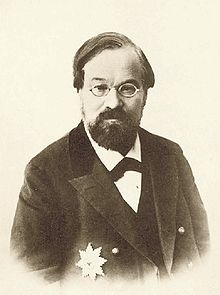Nikolai Vasilyevich Bugayev
Nikolai Vasilievich Bugajew ( Russian: Николай Васильевич Бугаев , English transcription Nikolai Vasilievich Bugaev ; born September 14, 1837 in Dusheti , Tbilisi Governorate ; † June 11, 1903 in Moscow ) was a Russian mathematician .
Life
Bugayev was the son of a military doctor and was sent to school in Moscow at the age of 10, where he had to finance himself partly by teaching. From 1855 he studied at the Moscow University at the Faculty of Physics and Mathematics with the degree in 1859 and then went to the Polytechnic in Saint Petersburg to become an engineer. In 1861 he returned to Moscow and turned there to mathematics. In 1863 he received his doctorate with an important thesis on the convergence of infinite series. This was followed by studying abroad in Berlin (with Karl Weierstrass and Ernst Eduard Kummer ) and Paris (with Joseph Liouville ). In 1866 he completed his habilitation in Moscow (Russian doctorate) with a dissertation on identities of Euler's number , and in 1867 became a professor at Moscow University.
He continued the lectures on functional theory , which his teacher August Juljewitsch Dawidow had introduced for the first time in Moscow, and, through his students, contributed to the establishment of a Russian analyst school in Moscow. His pupil Dmitri Fjodorowitsch Jegorow was with his pupil Nikolai Nikolajewitsch Lusin a few years after the death of Bugayev (around 1910) the founder of the Moscow School of Real Analysis and Functional Analysis.
Bugayev himself dealt with analysis and number theory and he also dealt with philosophy of mathematics, where he saw functions as the basis of mathematics. He advocated publishing mathematical papers in Russian, which encouraged the development of Russian mathematical terminology.
He was fascinated by discontinuous functions and found discrete analogies to differentiation and integration in number theory. He called the study of discontinuous functions arithmology. For them, they were not curiosities or monsters, as they were for other contemporary mathematicians, but an expression of human autonomy and free will (which he saw threatened by the deterministic currents of his time). He was a member of the Russian Psychological Society and published an essay on free will in its newspaper in 1889.
He was one of the founders of the Moscow Mathematical Society , from 1886 its vice-president and from 1891 its president.
Bugayev had been an honorary doctor of Moscow University since 1890 , since 1893 - honorary member of the Moscow Society of Naturalists , since 1897 he was a corresponding member of the Imperial St. Petersburg Academy of Sciences (today Russian Academy of Sciences ).
In 1898 he gave a lecture at the International Congress of Mathematicians in Zurich (Les mathématiques et la conception du monde au point de vue philosophie scientifique).
He was the father of the writer Andrei Bely , who portrays him as the eccentric Professor Korobkin in his short story The Moscow Eccentric (who wore a cat instead of a fur hat on his head). Bugayev was a talented chess player and, with his wealthy and beautiful wife Alexandra Dmitrijewna Bugajew, also played an important social role in Moscow. Her apartment on Arbat Street near the university was a meeting point for artistic and intellectual circles.
Web links
- John J. O'Connor, Edmund F. Robertson : Nikolai Wassiljewitsch Bugajew. In: MacTutor History of Mathematics archive .
Individual evidence
- ^ A b Loren Graham , Jean-Michel Kantor : Naming Infinity: A True Story of Religious Mysticism and Mathematical Creativity , Harvard University Press, Cambridge (Massachusetts) 2009, p. 67 f.
- ^ Biography of Nikolai Bugajew on the website of the Lomonosov University in Moscow. Retrieved October 7, 2018 (Russian).
- ↑ Master and Margarita . The image also found its way into Bulgakov's The Master and Margarita .
| personal data | |
|---|---|
| SURNAME | Bugayev, Nikolai Wassiljewitsch |
| ALTERNATIVE NAMES | Bugaev, Nikolai Vasilievich; Бугаев, Николай Васильевич |
| BRIEF DESCRIPTION | Russian mathematician |
| DATE OF BIRTH | September 14, 1837 |
| PLACE OF BIRTH | Dusheti , Tbilisi Governorate |
| DATE OF DEATH | June 11, 1903 |
| Place of death | Moscow |
